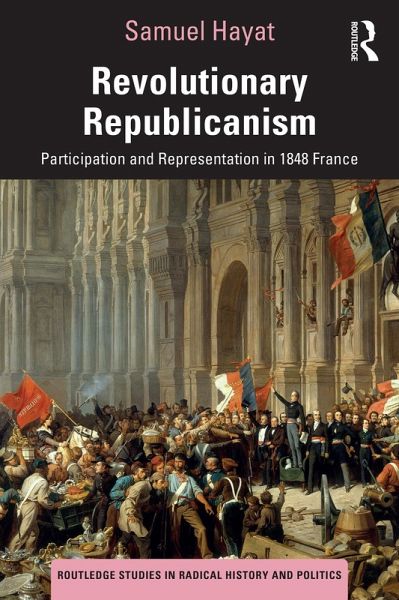
Revolutionary Republicanism (eBook, ePUB)
Participation and Representation in 1848 France
Versandkostenfrei!
Sofort per Download lieferbar
39,95 €
inkl. MwSt.
Weitere Ausgaben:

PAYBACK Punkte
20 °P sammeln!
Revolutionary Republicanism provides a history of French republicanism seen through a seminal episode of its creation - the 1848 revolution.The process of reinventing republicanism in 1848 gave rise to two opposite understandings of republicanism: a moderate one that merely adapted the institutions of representative government to popular sovereignty, and a more radical, 'social- democratic' notion of republicanism, based on inclusive forms of representation and aiming at the emancipation of the proletariat. These two notions of republicanism unfolded over the course of the few critical months ...
Revolutionary Republicanism provides a history of French republicanism seen through a seminal episode of its creation - the 1848 revolution.
The process of reinventing republicanism in 1848 gave rise to two opposite understandings of republicanism: a moderate one that merely adapted the institutions of representative government to popular sovereignty, and a more radical, 'social- democratic' notion of republicanism, based on inclusive forms of representation and aiming at the emancipation of the proletariat. These two notions of republicanism unfolded over the course of the few critical months between the revolution of February 1848 and the uprising of June 1848, which saw the victory of the moderate one. Playing devil's advocate to the traditional republican history that casts 1848 as a mere step in the continuous history of French republicanism, the book demonstrates that the events of the revolution amounted to a repression of all that the 'Republic' had meant up until that point, particularly the forms of participation and popular representation hitherto seen as constituting a republican regime. The text also sets out to chart the history of the 'democratic and social Republic', as the socialist and worker revolutionaries of 1848 called the radical republicanism they dreamed of founding and believed would fulfil the republican promise of emancipation.
This book will appeal to all those with an interest in the French revolutions, and the history of radical ideas.
The process of reinventing republicanism in 1848 gave rise to two opposite understandings of republicanism: a moderate one that merely adapted the institutions of representative government to popular sovereignty, and a more radical, 'social- democratic' notion of republicanism, based on inclusive forms of representation and aiming at the emancipation of the proletariat. These two notions of republicanism unfolded over the course of the few critical months between the revolution of February 1848 and the uprising of June 1848, which saw the victory of the moderate one. Playing devil's advocate to the traditional republican history that casts 1848 as a mere step in the continuous history of French republicanism, the book demonstrates that the events of the revolution amounted to a repression of all that the 'Republic' had meant up until that point, particularly the forms of participation and popular representation hitherto seen as constituting a republican regime. The text also sets out to chart the history of the 'democratic and social Republic', as the socialist and worker revolutionaries of 1848 called the radical republicanism they dreamed of founding and believed would fulfil the republican promise of emancipation.
This book will appeal to all those with an interest in the French revolutions, and the history of radical ideas.
Dieser Download kann aus rechtlichen Gründen nur mit Rechnungsadresse in A, B, BG, CY, CZ, D, DK, EW, E, FIN, F, GR, HR, H, IRL, I, LT, L, LR, M, NL, PL, P, R, S, SLO, SK ausgeliefert werden.













